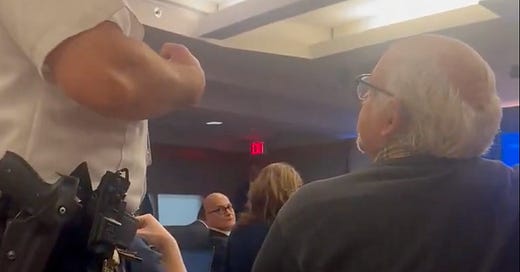
Iran strikes back at military targets while Israel escalates carnage in Gaza
"Media-Mind Readers"; Katie Halper Show
Of course, any serious examination of the issue would question if not refute the notion that Biden has been trying to prevent a regional war. I’ve written extensively on the Biden administration pretending to be working for a ceasefire when it is enabling the continuation of Israel’s slaughter in Gaza, which rolls on unabated as it expands its aggression to Lebanon and beyond. See news release from today via accuracy.org on Iran striking back at Israel, which notes Israel’s latest handiwork, photograph below via Ramy Abdu from Euro-Med Monitor. Imagine if one of the Iranian missiles had hit an Israeli baby, it would be on the front page of newspapers across the world….

But Iran clearly targeted military facilities, including Dimona, where Israel’s nuclear weapons facility is.
Ramy Abdu also noted yesterday: “Breaking: The Israeli army is retaliating against the Iranian attack by committing several massacres in central and southern Gaza, targeting unarmed civilians.”
cites my writing on the issue of “media mind-readers”, from 20 years ago, see piece below. Also, see my interview from last night with Katie Halper.SEPTEMBER 1, 2004 — FAIR’s magazine, Extra!
Media Mind-Readers
Pretending to know official motives is not journalism
As the U.S. government pressured the U.N. Security Council in October 2002 to endorse an invasion of Iraq, NBC anchor Tom Brokaw reported (10/17/02): “In Washington, administration officials worry that the continuing U.N. debate will only embolden Saddam if the language of the resolution is loaded with ambiguities.”
By talking about the officials’ “worry,” Brokaw was reporting not simply on what they said, but on their alleged internal state of mind. It’s a chronic problem in the media: The beliefs, motivations and intentions of certain preferred sources—usually U.S. government officials—are described matter-of-factly by the press, as though reporters had the ability to read the sources’ minds.
During the same period of the Brokaw report, for example, CBS’s Bill Plante stated (9/18/02): “The president is very concerned that allowing [the inspectors] back in without a tough new U.N. resolution would be meaningless.” And U.S. News & World Report wrote (9/30/02): “Bush administration officials worry that if Saddam does allow [inspectors] into Iraq, he will be able to bully and hoodwink them into declaring Iraq free of illegal weapons.”
By “reporting” the alleged thoughts and emotions of policymakers, such accounts put the sincerity of official motives off-limits for discussion. If it’s a fact that administration officials “worry” and are “very concerned” that Saddam Hussein would take advantage of the inspectors’ return, on what grounds can one argue that the officials might have a different agenda from the one they express?
Other possible reasons officials might have for wanting a “tough” U.N. resolution or for opposing inspections are more difficult to argue after the public has been thus “informed.”
“Governments lie,” as I.F. Stone was fond of reminding journalism students. But in the professional press, administration officials’ declarations of their intentions are taken at face value, as when CNN’s Dana Bash said on American Morning (6/10/04): “Democratic reforms in the broader Middle East . . . topped the White House agenda over the last several days.” The White House agenda is what the White House says it is—“democratic reforms”; the language tells us so.
AP (3/15/02) wrote that “the main missions of Vice President Dick Cheney’s trip—stopping Iraq, stopping terrorism and stopping Mideast violence—will come together during his Saturday talks in Saudi Arabia.” What Cheney says he is doing is what he is doing: “stopping Iraq” (from what?), “stopping terrorism” (not inflaming or instigating it) and “stopping Mideast violence” (not provoking or practicing it).
Even when the professed motives of officials are questioned, more idealistic reasons can be offered in their place. According to E.J. Dionne (Washington Post, 6/22/04), the administration “believed that knocking Saddam out of power could open the way for democracy in the Middle East and for a settlement of the Israeli-Palestinian conflict.”
But they found “little support among Americans for such a war. So rather than rest their case for war against Saddam on their real, perfectly defensible reasons, they argued it was a proper reaction to the terrorist attacks.” Poor officials, forced to lie because their true goals were too high-minded for the country.
Where ESP fails
While the media often seem to conflate stated goals with actual goals when covering a figure they seem sympathetic to, the same outlets cover leaders at odds with Washington in a decidedly different manner.
For example, AP (1/13/04) claimed that “privately, Bush administration officials worry that Venezuelan President Hugo Chavez is working with Cuba to oppose pro-American democracies in the region.” The report also stated that “the United States wants to kick corrupt nations out of the Organization of American States.” Here, U.S. worries and desires are presented as facts.
By way of contrast, an AP report (6/4/04) informed us that “Chavez said he hoped the prospect of a democratic vote would deter future attempts to overthrow his leftist government.” Note: not “Chavez hoped.”
Media seem to have, and encourage their readers to share, a direct line into the thinking of U.S. officials that they lack when it comes to others, whose statements are to be regarded critically.
But media ought to be engaging the assertions of all politicians in a similarly critical way. It’s easy enough to write, for example, “The administration says/claims/alleges it wants democracy in the Middle East,” and then to describe the actual policies and their impact as factually as possible, presenting evidence and a wide variety of viewpoints.
That is, it should be easy—if the oft-stated goals of journalists are indeed their actual goals.















Sam,
Your article reminds me of the critical thinking my of my days in Newton High School when my Civics and English teachers encouraged us to question the motives and purposes of officials andeve of the reporters themselves.
Thank you for your insightful reporting. It's an all too rare practice.
Simply put, the American & European news "media" are astonishingly biased. It reports what the Zionist psychopaths want you to believe rather than reality. To learn about how the Axis of Resistance is striking back at the Apartheid Entity's murders, war crimes, and human rights violations, and the effects, read Al Mayadeen English, The Cradle, PressTV, and RT.